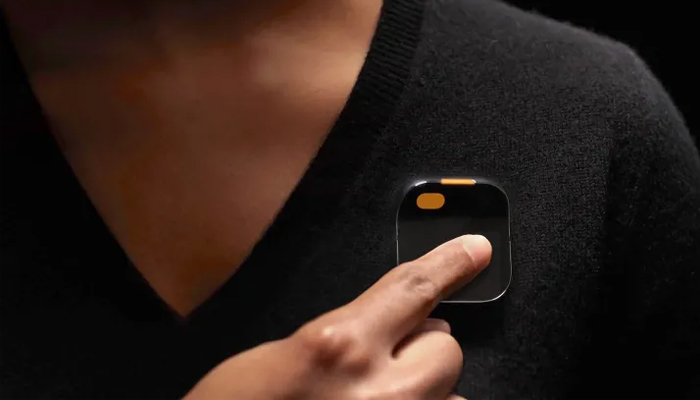Humane rolls out AI Pin with all functions like a smartphone
$699 lapel pin contains camera and a tiny laser projector that allows you to use your palm as little screen
Humane, an artificial intelligence (AI) startup, owned by former Apple designers Imran Chaudhri and Bethany Bongiorno, has just rolled out their first product five years after the company's launch.
The $699 lapel pin is a device that can easily replace smartphones as it includes functions like voice controls to search for information, send texts, and even make calls.
Moreover, it contains a tiny laser projector that allows you to use your palm as a little screen to see the time, date, and anything nearby.
“There are no wake words so it’s not always listening or always recording,” Chaudhri said at the beginning of a 10-minute launch video on the company’s website.
“In fact, it doesn’t do anything until you engage with it, and your engagement comes through your voice, touch, gesture or the laser ink display," he added.
Additionally, customers will have to pay a $24 monthly data subscription to T-Mobile, according to the company, because the device, unlike smartwatches, is not tethered to a smartphone.
The company raised over $200 million in a $100 million financing round in March, with contributions from OpenAI CEO Sam Altman and Salesforce CEO Marc Benioff.
The AI startup also revealed that orders for the Humane AI Pin will begin on November 16.
Chaudhri and Bongiorno, in the video posted on Thursday, demonstrated some of the device’s features and discussed the technology, which is powered by a Qualcomm chipset, CNBC reported.
The AI Pin, as demonstrated in the video, has a built-in speaker and camera, that flashes a light when activated. It can capture photos or videos, which can be viewed on Humane's web app.
The device can also translate spoken conversations from Spanish to English in real-time.
The device can also allow users access to AI services through the internet, with companies like Microsoft, Google, and OpenAI contributing to the platform.
Users can request music or information from sci-fi films, with answers provided by large language models. Tidal subscriptions are required for music access.
The device's assistant can also summarise daily calendars, messages, and health data.
-
Shanghai Fusion ‘Artificial Sun’ achieves groundbreaking results with plasma control record
-
Polar vortex ‘exceptional’ disruption: Rare shift signals extreme February winter
-
Netherlands repatriates 3500-year-old Egyptian sculpture looted during Arab Spring
-
Archaeologists recreate 3,500-year-old Egyptian perfumes for modern museums
-
Smartphones in orbit? NASA’s Crew-12 and Artemis II missions to use latest mobile tech
-
Rare deep-sea discovery: ‘School bus-size’ phantom jellyfish spotted in Argentina
-
NASA eyes March moon mission launch following test run setbacks
-
February offers 8 must-see sky events including rare eclipse and planet parade












